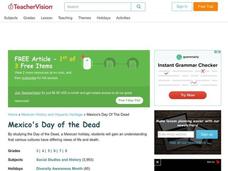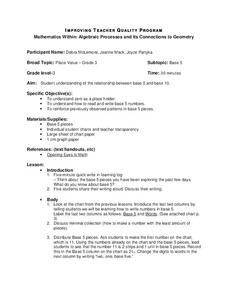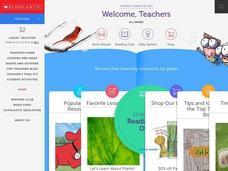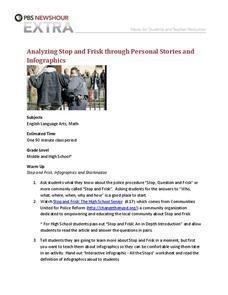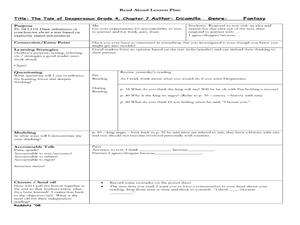Curated OER
Arthur's Halloween
Students read a story and respond. In this caring and helping others lesson, students read Arthur's Halloween making predictions as they go. Students write a report on caring, create a caring journal where they record how they have...
Curated OER
Mexico's Day of the Dead
Students explore global culture by researching a Mexican holiday. In this Day of the Dead lesson, students read assigned text which discusses the view of death in several different cultures including the U.S. and Mexico. Students write a...
Curated OER
Comparing Tales through Performance
Students compare and contrast versions of The Three Little Pigs. In this fairy tale lesson, students read 3 versions of the fairy tale and dramatize them in order to analyze the similarities and differences.
Curated OER
In the Middle - Middle School Poetry
Students analyze and interpret poems. In this poetry lesson, students are read poems aloud, discuss the meanings in groups, and complete two worksheets after listening to the poems. Links to the worksheets and discussion questions are...
Curated OER
Anne Frank: The Island of the Skog
Learners read and discuss The Island of the Skog by Steven Kellogg and examine the illustrations, keep a "discrimination log," and write about one example of discrimination and how they could have intervened to stop it.
Curated OER
Place Value
Third graders study the relationship between base 5 and base 10. They determine zero is a place holder and how to read and write base 5 numbers. They reinforce previously observed patterns in base 5 pieces. They choose another base and...
Curated OER
What's Up?
Students examine the vocabulary and objects associated with objects in the sky and weather. They observe the sky outside of their classroom and create a list of things in the sky. Students then analyze a poster, read and discuss key...
Curated OER
Waterdrops Watershed Issue
In this environment worksheet, students take part in a variety of activities that includes an experiment, word search, and readings related to the watershed.
Curated OER
Generalizations: How Accurate Are They?
Students examine how generalizations can be hurtful and unfair. They devise ways to qualify statements so they avoid stereotyping other people and recognize and modify generalizations. They think about generalizations and stereotypes...
Curated OER
Cover To Cover
Young learners are introduced to the most basic elements and concepts of a book with this pre-kindergarten language arts instructional activity. Through modeling and discussion, the whole class explores how to read a book and how to...
Curated OER
Good Health Manners
Pupils read and discuss a list of Good Health Manners and examine how to avoid the flu. They complete a worksheet, and write why it is important to follow good health manners.
Novelinks
The Tempest: Vocabulary Bingo
Bingo! Practice vocabulary from William Shakespeare's The Tempest with a fun matching game. As you call out the definitions, class members mark the new vocabulary words that match and try to get five in a row.
PBS
Analyzing Stop and Frisk Through Personal Stories and Infographics
How much can you learn about an important topic from a single image? High schoolers analyze an infographic that represents the number of stops performed during the Stop and Frisk police procedure. After building background information...
Do2Learn
Waiting Your Turn to Speak
Have you ever been so excited to talk that you interrupted another person? Help young conversationalists wait their turn to speak with a social skills activity.
Curated OER
The Tale of Despereauz
Fourth graders read text and draw inferences or conclusions about the text. In this reading lesson, 4th graders discuss their opinions on what was read and state why they think that way to a partner.
Curated OER
When Sophie Gets Angry-Really, Really Angry
Students explore feelings. In this language arts lesson, students realize that books help in talking about feelings. Students discuss how they feel during the reading of a story and listen to each other in answering various comprehension...
Curated OER
Lesson 3: Making Predictions
In this making predictions worksheet, students read a newspaper article, locate the "Five Ws and the H," and then make logical predictions on the content that they read and then analyze those predictions based on a rubric.
Curated OER
Inferences/Opinions
Fourth graders practice making inferences and forming opinions. For this reading strategy lesson, 4th graders listen to the book Woodsong by Gary Pauisen. They make predictions about the story before beginning and discuss the story as...
Curated OER
The Fear Place
Young scholars use the strategy turn and talk to discuss inferences they have while reading the book The Fear Place. In this inferences lesson plan, students answer discussion questions and read independently as well.
Curated OER
Harriet The Spy
Fourth graders investigate the style of diary writing as its own genre of literature. They read Harriet The Spy in order to have a text for this literature study. Students use the skill of prediction to preview the story, and then...
Curated OER
Wonderfully Wild Unit
Young scholars explore the ethics of 'fair' in regards to humans relationship with wildlife. In this wildlife study instructional activity, students read the story starters about wildlife and then discuss how to finish the story. Young...
Curated OER
Soldier Emily
Students explore the role of women as soldiers during the Civil War period.
They read about a young Brooklyn woman who concealed her identity to
join the army and imagine how her family or fellow soldiers responded. They role play a...
Curated OER
Enrichment Activities - "Mrs. Frisby and the Rats of NIMH"
Fifth graders read the novel "Mrs. Frisby and the Rats of NIMH." They discuss the various characters in the book, and the different types of conflict that take place within the book. They also research owls and rats to make comparisons...
Curated OER
At the Park
Students in ESL classes read and interpret sentences about the park. They change the verb tense of the sentences and practice writing their own sentences. Student pairs read/perform dialogues in front of the class.



